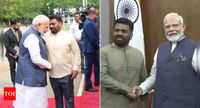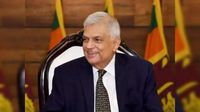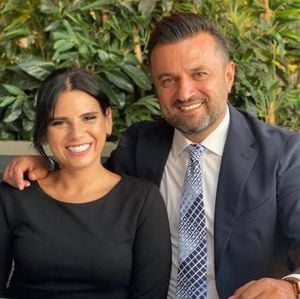COLOMBO: In an exclusive conversation with NewsX/The Sunday Guardian in the backdrop of Prime Minister Narendra Modi’s visit to Sri Lanka, former Sri Lankan Prime Minister, and later President, Ranil Wickremesinghe spoke of India-Sri Lanka relations and Sri Lanka’s path to recovery after its economic downturn.
Wickremesinghe expressed his expectations from Modi’s current visit, stating, "I would expect that we take the next step in ensuring a closer relationship between our two countries. The vision statement that was prepared in 2023 under my tenure laid out the framework for the same. It included connectivity and collaboration in the dairy sector. The time has come to execute the plans and make them operational."
When asked about the delays in the execution of projects and MOUs, Wickremesinghe explained, "Unfortunately, many things in Sri Lanka take a long time and sometimes delays occur on the Indian side. Prime Minister Modi has always been active and pushing it." He noted that while agreements for energy investments, including a coal power station, were signed before the Paris Climate Agreement, India showed a preference for a solar energy project.
Highlighting India's role in Sri Lanka's recovery, Wickremesinghe noted, "India provided a loan worth $4.5 billion via various lines of credit, which helped Sri Lanka immensely. Moreover, Indian investments along with Indian connectivity projects have been helpful. Investors are holding themselves back as Sri Lanka still hasn’t fully recovered from economic bankruptcy." He projected that Sri Lanka would need another one to two years for full recovery and emphasized that Indian investment could encourage further foreign investments.
The conversation also touched on the controversial Adani wind power plant deal, which was scrapped under Wickremesinghe's government. He attributed the failure to price issues and infrastructure challenges, stating, "It was because of price. We had multiple projects and each one of them had a different price. However, with regard to the particular project, the investor need not bear the cost but there were other challenges." Wickremesinghe underscored the importance of Adani’s investment for Sri Lanka, suggesting it would encourage other investors.
Another significant project mentioned was the Colombo Port City, which has seen billions invested by Chinese companies. Wickremesinghe elaborated on its concept, stating, "When I was PM from 2001-2004, we asked a Singapore company to do a plan for Colombo city. They pointed out that the port city was full, and heritage building needed to be demolished for future expansion." He explained that the project, which expanded from 300 to 600 acres, was intended to develop commercial real estate and generate foreign exchange.
However, concerns have arisen regarding potential tax benefits for foreign investors. Wickremesinghe acknowledged these worries, stating, "Sri Lanka businesses have always asked for tax relief, however, in this case, the tax concerns are related to foreign investors and not local. All the investments are in dollars." He indicated that discussions regarding tax benefits would continue with investors.
In discussing the Hambantota port, Wickremesinghe highlighted the differences between it and the Colombo Port City project. He stated, "The Hambantota port project was given for a 100-odd-years’ lease for a billion dollars. The Chinese loan was on a concession basis and the money that was made from the project was used as reserve and we decided to pay the Chinese gradually." He defended the terms of the Hambantota deal, asserting that the overall situation favored Sri Lanka.
Wickremesinghe also addressed the allegations surrounding his administration, particularly regarding the Easter Sunday attack and the Central Bank bond scam. He stated, "What did the commission report say? … It says while transferring some property to the police I should have gone through the superintendent and a set procedure. I am open to debate about these allegations. Regarding the bond scam…I had nothing to do with it. Some people were prosecuted and the issue is in the court. The commission that was set up for the Easter attack has cleared my name." He expressed frustration at the accusations, attributing them to foreign influences, saying, "These allegations are pushed by foreign churches. It is a Buddhist country, and I am not answerable to any bishop or cardinal."
The discussion also turned to the political landscape in Sri Lanka, with Wickremesinghe noting a shift away from traditional political dynasties. He remarked, "We broke the dynasty in 1988 when Premadasa became President. He didn’t have any dynasty. In 2015, we backed candidates who did not belong to any dynasty." He recognized the global trend of voters seeking alternatives to established parties, drawing parallels to political movements in the UK and the US.
As for the current government led by Anura Dissanayake, Wickremesinghe stated, "In my term in just six months, we solved the ration shortages and signed a deal with the IMF. The current government is new and should be analyzed after the first 100 days. It seems they are not moving." He expressed hope for progress but remained skeptical about the current administration's effectiveness.
Finally, Wickremesinghe addressed the ongoing issue of Indian fishermen being detained by Sri Lankan authorities. He argued for a firm stance, saying, "If a person jumps into your house and tries to take some object, what would you do? Would you hand over them to the police or shake their hands and let them go? The problem is your Tamil fishermen who come in our waters and you talk about the rights of Tamils." He concluded by emphasizing the importance of India in Sri Lanka's future, hoping for a developed nation with a stable law and order situation.





